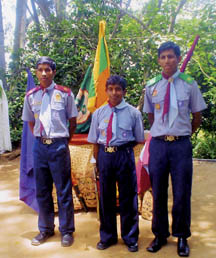|
observer |
|
|
|
|
|
OTHER LINKS |

|

|

|
|
|
|
|
What is brain storming?
One dictionary states "The practice of thrashing out a problem by intensive group discussion, in which ideas are put forward in an extempore (without preparation) manner, is brain storming'. Another one states, "Brain storming is a group problem-solving technique that involves the spontaneous contribution of ideas from all members of the group."
There are several rules that should be observed when it comes to brain storming.
* Every idea should be respected and no idea should be discarded, or criticised.
* None should make fun of ideas put forward.
* Everybody should feel free to participate.
* The whole group should be involved so that new ideas can be generated spontaneously.
Brain storming is a group activity and each group must appoint its own leader. The leader first reads out the topic and writes it on a sheet of paper or on the board, and the other members of the group suggest ideas related to the topic.
Ideas may differ, nevertheless, each child must be given an opportunity to voice his/her ideas on the topic. Some may give more ideas, but each one must suggest at least one idea.
The group leader should be quick to jot down all the ideas. When all the ideas have been generated, the members of the group can evaluate the ideas by going through the list and marking out irrelevant ideas.
The Grade 8 students of my school tried out this technique in their English lesson.
The following ideas were listed.
* Could save time.
* More ideas came out and they could be shared.
* The most suitable ideas could be selected.
* Was a very interesting method and a lot of fun.
* Was a participatory method. No, students could play hide and seek.
* At the beginning some were lazy to think, but now they find it interesting.
At the end of the brain storming session, members of the group separated the ideas into paragraphs and wrote the essay.Even though children hesitated to give ideas at the beginning, they gradually contributed their own ideas and facts with enthusiasm as no idea was rejected.
This technique is a successful method to improve writing skills and build up a good rapport among peers.
Reconstruction of schools in Hambantota
Many programmes to reconstruct schools damaged and destroyed by the December 2004 tsunami are being carried out around the country. One such programme to reconstruct school infrastructure is being carried out in the Hambantota district by UNICEF. Accordingly, 35 schools, which were destroyed or damaged by the tsunami, as well as schools which have received children moving to newly constructed resettlement communities, will be rebuilt through this project. Over 20,000 children and teachers stand to benefit from this.
UNICEF Sri Lanka is carrying out this programme in cooperation with the Ministry of Education and the United Nations Office for Project Services, which also manages the construction.
The second project to be completed under this programme, the new building of Zahira Primary School, was handed over to the teachers and students recently. More than 500 students and teachers will benefit from this project. Zahira College was badly affected by the tsunami, with several students and teachers including the principal, falling victim to it. The primary school students now have 12 new classrooms, a playground and sanitary facilities, while staff quarters and a safe parapet wall have also been added.
Many activities planned for Peace Day
Sri Lanka and the rest of the world will celebrate the International Day of Peace for the 24th time on September 21 (Thursday).
|
|
A variety of peace-building activities and programmes have been organised by the Secretariat Coordinating the Peace Process (SCOPP) and the Sri Lanka National Commission for UNESCO (SLNCU) to observe this day.
At a recent news conference held to announce the activities, Dr. Hiranthi Wijemanne of UNESCO said the need for peace-building has never been felt stronger before than now, when we witness an escalation in violence, ceasefire violations and recurring hostilities.
Secretary General, SCOPP, Dr. Palitha Kohona said the Government has given its topmost priority for peace-building and invites the public to join in the activities organised to carry this message forward.
The activities include peace-building recreational activities with the participation of 1,500 children from welfare centres in Ampara, the launch of a people's peace vision declaration, a peace meditation campaign with Sarvodaya, a peace rally from Anuradhapura to Colombo on September 21, a model parliament sitting where children will talk about peace and co-existence in Batticaloa.
A public meeting will also be held at the Town Hall on September 21, where a peace memorandum will be handed over to the Government, the Opposition, the Norwegian Ambassador, the LTTE, the Co-Chairs and country leaders. Among the other activities are children's camps involving 25 schools representing all ethnic groups, a giant jigsaw puzzle, a peace run at Galle Face Green, sports events between children from the Vanni and the south, workshops, art and cultural exhibitions and debates.
The UN General Assembly declared an International Day of Peace in 1981 and announced that the opening day of its regular session in September will be observed as the Peace Day. On September 7, 2001, the General Assembly decided that from 2002, the International Day of Peace will be observed on September 21 every year. The idea is to have the entire world observe peace and non-violence with the cessation of hostilities during the day.
The day provides an opportunity for individuals, organisations and nations to create practical acts of peace on a shared date. It can also be used to highlight the Decade for a Culture of Peace and Non-Violence for the Children of the World, which spans from 2001 to 2010.
'Baden Powell Peak' at Himalaya
The World Scout Movement has taken steps, with the concurrence of the government of Nepal, to name a 5,825 metre-high Himalayan peak as the 'Lord Baden Powell Peak' and the path leading to the peak as the 'Baden Powell Track'. This will mark the 100th anniversary of the Scout Movement.
|
|
A team comprising international boy scouts will undertake an exploratory trek to the Himalayas from September 14 to 25 to celebrate the event.
Representing the Sri Lanka Scout Association, three Scouts from Dharmaraja College, Kandy, Ajith Jayasekera, Chameera Chandrasena and Nalaka Hapuhinna have already left for Nepal to take part in this trek. Jayasekera is the leader of the Dharmaraja Scouts Group and has climbed the Himalayas 14 times; he was also appointed as the overall leader of all the scouts who will be taking part in this trek.
The other two are Presidents' Scouts. Prior to their departure, they were presented the national flag at a ceremony held at Lake View Park, International Scout Centre, Dharmaraja College. Lord Baden Powell had visited this centre on two occasions. Chief Scout Commissioner, H. S. Weerakoon and International Commissioner, Shantha K. Madurawe were the chief guests on the occasion.
Assistant Commissioner, Shiraz Sali and Dharmaraja College Principal, S. M. Keerthiratne were among the participants.
Acting opportunities for talented children
The Children Skills Development Programme (CSDP) will be providing acting opportunities to about 20 talented children below the age of 18, in 'Naththal Seeya', the children's Christmas teledrama it's producing.
The organisation has already produced 11 single-episode teledramas, giving children from different parts of the island the chance to star beside professional and experienced actors. Even if they are not selected for the teledrama, the CSDP will give all talented children the opportunity to take part in its programme 'Children's Skills Meet'.
Those interested in starring in the teledrama, please inform the CSDP at No. 51, Sri Dharmarama Road, Colombo 9, or on telephone numbers 0112-672718 or 0112-689536.












